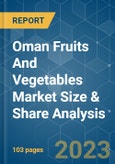The Oman Fruits and Vegetables Market size is estimated at USD 1.52 billion in 2023, and is expected to reach USD 2.11 billion by 2028, growing at a CAGR of 6.77% during the forecast period (2023-2028).
Key Highlights
- Since agriculture is considered the pillar of economic growth, the Omani government has taken various measures to ensure food safety and security. According to Oman's Agriculture Ministry, the agriculture and fisheries sectors witnessed a growth of 9.8%. Production of vegetables and fruits in Oman has been divided into two periods. The first period begins in September, while the second begins in February. In the first period, vegetables like pepper, eggplant, cucumber, and pumpkin are grown in warm temperatures. Winter cabbage, cauliflowers, and peas are grown in the country in the second period.
- Owing to increasing disposable incomes, people in Oman are presently more focused on healthier diets, with more inclusion of fruits and vegetables. In addition, with the rising ex-pat population in Oman, there is a shift from traditional dietary habits to organic foods, which has influenced vegetable production in the country. Production of total primary fruits and vegetables in the country accounted for 514,393 metric ton and 782,847.7 metric ton, respectively, in 2021. Tomato is a prominent vegetable produced in the country, followed by eggplants, cauliflower, chilies and peppers. Dates and watermelon were majorly produced among fruits, followed by banana, mango, lemon, and papaya in 2021.
- The Oman Investment Authority (OIA) announced the launch of a new project to market vegetables and fruits in the Sultanate in cooperation with the Ministry of Agriculture and Fisheries in 2020. The project aims to establish model farms in various governorates according to the comparative advantage, diversity of climates, and environments suitable for the growth of various crops. Thus, considering these factors, the market is projected to record steady growth.
Oman Fruits & Vegetables Market Trends
Growing Preference for Organic Produce
The demand for organic food is gaining traction, bolstered by consumers’ growing concerns for health and wellness. Demand is strong for fresh fruits and vegetables. Higher disposable incomes have resulted in consumers shifting from a carbohydrate-based staple diet to a nutrition-rich diet. In addition, the growing awareness of health among a larger section of the population, especially millennials, is leading them to move toward organic products. To meet this demand, many organic farms have launched new products. The Masrooq Farm in Ibri, Al Dhahirah Governorate, completely switched to organic cultivation by focusing on organic dates. The sustainable future of agriculture in Oman, therefore, depends very much on adopting land and water-saving technologies such as greenhouses, soilless culture and hydroponics, and soil-based Integrated Production and Protection Management (IPPM).
An emerging key global trend is the increasing production of vegetables in greenhouses and vertical farms. These production technologies help mitigate many limitations on conventional open-field vegetable farming in desert countries such as Oman, where summer temperatures sometimes reach above 45ºC. One such approach is the net house, developed by the International Centre for Agricultural Research in the Dry Areas (ICARDA) and Arabian Peninsula National Agricultural Research Systems (NARS). It is a fabric, insect-proof net greenhouse structure that enables high-yield vegetable production in desert conditions for 8 to 9 months of the year.
The Ministry of Agriculture and Fisheries, in cooperation with the authorities concerned, is endeavoring to adopt organic farming through R&D efforts that contribute to promoting organic farming. The global demand for vegetables is increasing and will continue to do so. Growth in demand for organic vegetables is especially strong in wealthier countries such as Switzerland, Sweden, and the United Arab Emirates. Thus, the efforts by the government to promote sustainable farming and consumers' growing preference for natural products are expected to drive the demand for organic fruits and vegetables in the country.
Greenhouse Cultivation is Boosting the Vegetables Market
Oman is one of the Arab countries in the southeastern portion of the Arabian Peninsula. The country is primarily dependent on oil and gas to sustain its economy. Oman's economic development policy increasingly emphasizes agricultural and fishery commodities as vital in expanding its non-oil contribution to the gross domestic product. Chief among these commodities are fruit and vegetables. Farming in the desert is a challenge, but with the help of The Ministry of Commerce and Industry, in 2020, two Omanis, Hamyar Khamis al Rawahi and Hatim bin Sulaiman bin Hamood al Rawahi, have successfully overcome the odds and produced 180 ton of cucumber per month. They started with 15 greenhouses to produce cucumbers and now have 62, helping them cultivate for almost eight months a year.
Local Omani cucumber is among the most important traditional vegetable crops grown in the Sultanate of Oman. Different names, such as Samail, Bahla, and Nizwa, were given to local types, resulting in about 24 different accessions of local cucumber. The increased consumer demand for cucumber in recent years has resulted in expanding the area under cultivation and introducing new hybrid cultivars. The damping-off disease is Oman's most important biological constraint to greenhouse cucumber production. Average losses of over 6% of seedlings are common, with much higher losses occurring on many farms, especially where crop management practices are poor, thus hindering the production of cucumbers in the country. However, with the increasing focus on boosting crop production, various awareness programs are being conducted on crop management practices, which in turn, is leading to market growth.
Additional Benefits:
- The market estimate (ME) sheet in Excel format
- 3 months of analyst support










